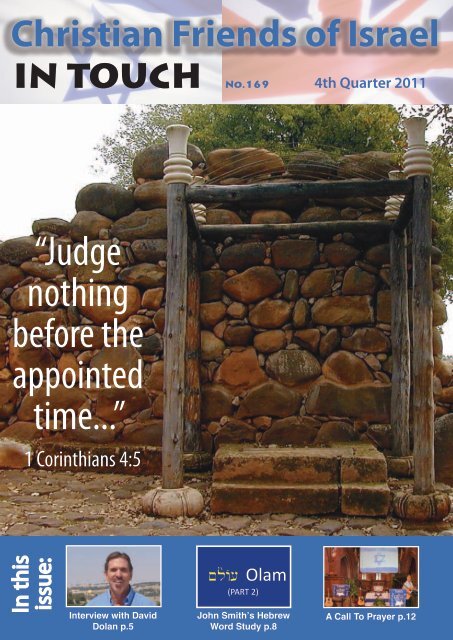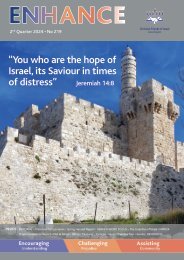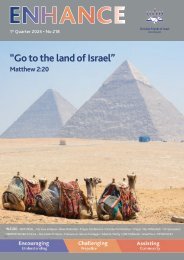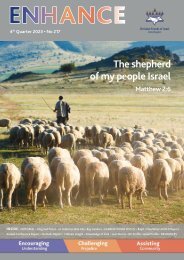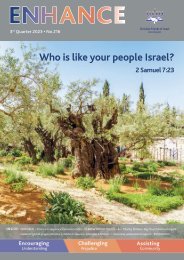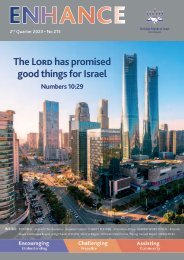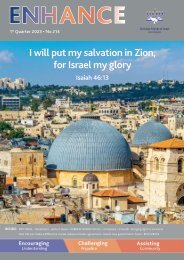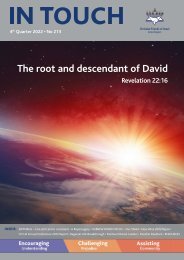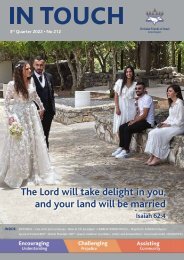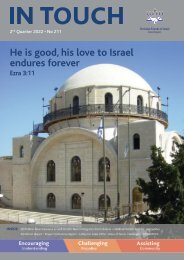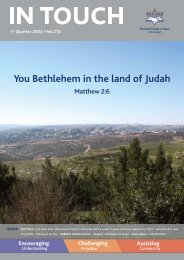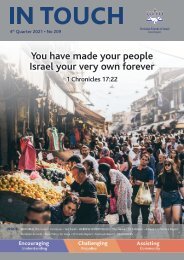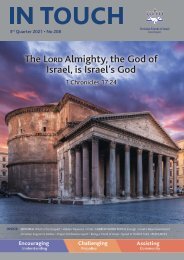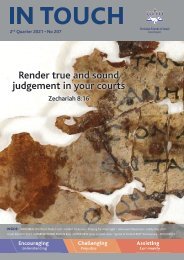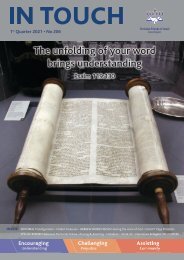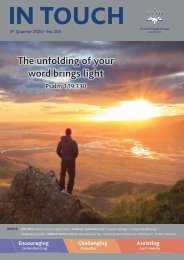You also want an ePaper? Increase the reach of your titles
YUMPU automatically turns print PDFs into web optimized ePapers that Google loves.
Christian Friends of Israel<br />
IN TOUCH No.169 4th <strong>Quarter</strong> <strong>2011</strong><br />
“Judge<br />
nothing<br />
before the<br />
appointed<br />
time...”<br />
1 Corinthians 4:5<br />
<strong>In</strong> this<br />
issue:<br />
<strong>In</strong>terview with David<br />
Dolan p.5<br />
~l’A[ Olam<br />
(PART 2)<br />
John Smith’s Hebrew<br />
Word Study p.8<br />
A Call To Prayer p.12
REFUTED BY<br />
HISTORY & FACT<br />
<strong>In</strong> <strong>Touch</strong><br />
is the newsletter of<br />
Christian Friends of Israel<br />
UK<br />
CFI-UK seeks to bless Israel by<br />
means of practical and moral<br />
support, and to serve the Church in<br />
teaching about God’s purposes for<br />
Israel and the Hebraic roots<br />
of our faith.<br />
CFI also produces a monthly News<br />
Report, a monthly Prayer Letter and<br />
a Middle East Update CD/MP3.<br />
Please send for full details of the<br />
practical projects and also of the<br />
many teaching resources available.<br />
As an educational charity,<br />
we carry a variety of<br />
resources relevant to our<br />
purpose. We do not<br />
necessarily endorse every<br />
view expressed by our<br />
guest writers or authors<br />
of these resources.<br />
Published by:<br />
CFI Communications<br />
PO Box 2687<br />
Eastbourne<br />
BN22 7LZ<br />
Tel: 01323 410810<br />
Fax: 01323 410211<br />
Email: info@cfi.org.uk<br />
Websites: www.cfi.org.uk<br />
www.isrelate.com<br />
www.keshercourse.org.uk<br />
Registered Charity<br />
No. 1101899<br />
Front Cover Image:<br />
Judgement seat at the gate of Dan<br />
© BiblePlaces.com<br />
CFI Annual Conference<br />
images pages 4 and 5:<br />
© P. Pawley<br />
CFI-UK’s Chief Executive Jacob Vince teaches<br />
on the importance of seeing the big picture<br />
<strong>In</strong> June 2010<br />
an article, in<br />
the immediate<br />
aftermath of the<br />
‘Flotilla’ episode,<br />
appeared in the<br />
Irish Times written<br />
by Zion Evorony,<br />
A m b a s s a d o r<br />
of Israel to<br />
Ireland. <strong>In</strong> it he suggested that “future<br />
historians will puzzle over the western<br />
media’s portrayal of the flotilla activists<br />
as humanitarians, ignoring evidence<br />
of motive. An impartial historian<br />
analysing, 20 years hence, the events …<br />
will be perplexed by several aspects of<br />
the media’s coverage of the episode.”<br />
(Irish Times Jun, 2010).<br />
Well, it has not needed 20 years to elapse<br />
before analysis. The Palmer Report<br />
(Report of the Secretary-General’s Panel<br />
of <strong>In</strong>quiry on the 31 May 2010 Flotilla<br />
<strong>In</strong>cident July<br />
<strong>2011</strong>) which<br />
expressed the<br />
conclusions<br />
of the UN<br />
commission<br />
chaired by the former New Zealand<br />
PM Geoffrey Palmer is now public.<br />
The report states that, “Israel faces a<br />
real threat to its security from militant<br />
groups in Gaza. The naval blockade<br />
was imposed as a legitimate security<br />
measure … and its implementation<br />
complied with the requirements of<br />
international law …” Yes, there are<br />
aspects upon which Israel is criticised,<br />
but these criticisms could only be made<br />
with hindsight and I am sure Israel<br />
will learn from an event in which a<br />
regrettable loss of life occurred.<br />
Now you may wonder why, when<br />
there are such immediate pressing<br />
issues once more being confronted by<br />
Israel and the Middle East, I should<br />
focus upon this historical, if recent,<br />
event. Well the reason is that we must<br />
always be careful, as apostle Paul writes<br />
in (1 Corinthians 4:5), not to judge<br />
anything before its time or in other<br />
words arrive at premature conclusions.<br />
This is a lesson we must learn, but even<br />
more so those who report and interpret<br />
events in the media. They, with their<br />
position of influence and privilege,<br />
carry a much greater responsibility<br />
and, as a consequence, much more is<br />
expected from them.<br />
Moses, when instructing upon how to<br />
determine whether a message that has<br />
been spoken is of the Lord, suggests<br />
the hearer wait to see whether what<br />
has been spoken of takes place. The<br />
instruction goes on to suggest that as<br />
events unfold, if something has been<br />
spoke of incorrectly then the speaker<br />
should be ignored. (Deuteronomy<br />
18:17-22)<br />
Likewise we must not let the<br />
immediate, and at times frenetic,<br />
happenings distract from seeing the<br />
broader overview events as they unfold.<br />
Neither should those who commentate<br />
on such events<br />
“We must be careful not to<br />
jump to conclusions in our own<br />
strength.”<br />
get away<br />
with claiming<br />
presumptions<br />
and perceptions<br />
as fact, in the<br />
expectation that by the time they are<br />
fully known they will be lost in the<br />
avalanche of the next pressing issue.<br />
So, as we consider the more immediate<br />
prevailing events of our day, we<br />
too must be careful not to jump to<br />
conclusions in our own strength. We<br />
are to bring matters before the Lord in<br />
prayer and at times intensive prayer.<br />
Remarkably, He persists in graciously<br />
choosing his Church and Israel in<br />
different ways to accomplish His<br />
outcome. This is not without cost and<br />
doesn’t happen immediately or when<br />
we might like. But God has a strategy<br />
and will work it out.<br />
Our prayer is that we all may be<br />
working with Him in this, but should<br />
He wish to work in spite of us then<br />
may it be His will that is done. For it<br />
is God who works in you to will and<br />
to act according to his good purpose.<br />
(Philippians 2:13)<br />
2 // IN TOUCH
CONFERENCE<br />
Crawley, West Sussex<br />
November 12th <strong>2011</strong><br />
Tickets: £20 in advance<br />
Dial: 0800 032 2088<br />
for more information<br />
CFI.ORG.UK // 3
CFI-UK ANNUAL<br />
CONFERENCE<br />
This year’s conference, at Victoria Baptist Church in Eastbourne, featured the UK premiere of Hatikvah Film Trust’s<br />
new documentary: ‘Blessing, Curse or Coincidence - Vol. 1 - Israel: The Womb of the Kingdom of God on Earth’.<br />
This is now available on DVD (including a study guide for small-group use) from CFI-UK. There were three update<br />
and teaching sessions on the current situation in Israel from David Dolan, and his new novel: “Millennium - The<br />
LORD Reigns” went on sale there for the first time anywhere in the world. Our Chief Executive, Jacob Vince, also gave<br />
a review of the work of CFI-UK over the past 12 months. Thank you to all who attended. If you were not able to be<br />
present, all the three main teaching sessions were recorded and can be ordered on audio CD using the enclosed order<br />
form, or from our Eastbourne office and/or the CFI-UK webshop (including MP3 audio file downloads).<br />
David Soakell and the worship band lead singing<br />
Victoria Baptist Church<br />
Stephen Briggs (centre) - Hatikvah Film<br />
Trust in the CFI-UK resources area<br />
Bob Hobbs<br />
Chairman of the CFI-UK Board of Trustees<br />
4 // IN TOUCH
INTERVIEW WITH<br />
DAVID DOLAN<br />
David Dolan is a Christian Journalist who has been reporting on Israel for over 30 years.<br />
Sam Hailes spoke to him to find out more about his career and the situation in the Land.<br />
SH: What’s it like to be a journalist in<br />
Israel?<br />
DD: I would say it’s the most exciting<br />
place on earth to work as a journalist.<br />
We actually have the third largest<br />
permanent press corps in any one<br />
country. There’s always something new<br />
happening. On the other hand it’s a<br />
difficult assignment because so much of<br />
the news is about struggle and violence<br />
and war. It can get a little depressing at<br />
times but it’s also exhilarating so I wouldn’t exchange it for<br />
anywhere else.<br />
SH: What’s it like to be a Christian in Israel as opposed to in<br />
the Palestinian territories?<br />
DD: The legal systems are quite different. Israel is a western<br />
style democracy and for the most part the benefits and freedoms<br />
we have in the West are there. Having said that, Christians are<br />
a small minority and some of the Orthodox groups are not so<br />
happy to have Christians there. As a whole the laws are fair and<br />
people are able to exercise their faith quite freely. Officially in<br />
the West Bank that’s the case as well but the Islamic influence<br />
there is much stronger. Hamas has persecuted various pastors<br />
there too. It’s not frankly easy on either side. On the Arab side<br />
one can be killed for one’s faith.<br />
SH: You have lived in Jerusalem for over 30 years, is it a<br />
dangerous place to be?<br />
DD: I find Jerusalem to be a very easy place to live in terms of<br />
personal threats. I tell people who are concerned about coming<br />
to Israel that I have been physically attacked three times – all<br />
of them in the States. I actually have a scar on my head from<br />
where I was mugged last Easter weekend in South Florida.<br />
Having said that you do have to be careful and when there<br />
are periods of uprising or intense violence, certainly riding the<br />
buses at times can be risky and challenging. But overall it’s a<br />
fairly safe place. The crime rate is certainly much lower than<br />
most American cities.<br />
Towards the late 90s I had been doing it over a decade I<br />
approached CFI and said: “Don’t you think this is now maybe<br />
becoming passé, because there’s so much now on the <strong>In</strong>ternet?”<br />
So they surveyed people and they found that yes they do<br />
appreciate it because there’s so much. My report is an overview<br />
of what’s gone on with a focus on the highlights. Having the<br />
years as a journalist there, I’m able to sort through things. It still<br />
seems to be blessing many people, as they use it for prayer and<br />
information, and I’ve been doing that for 25 years now.<br />
SH: People talk a lot about ‘God’s purposes for Israel’. What<br />
does that phrase mean to you?<br />
DD: The Hebrew Bible makes clear that Israel would be God’s<br />
witness on earth. Witness to His existence, the reality of that.<br />
Witness to the fact that He is God, He would demonstrate<br />
His power through them, in miraculous ways. And witness<br />
to futuristic prophecies coming true as well. And of course<br />
Israel is the vehicle in which the Messiah comes to earth. Now<br />
obviously there’s a dispute as to whether He’s coming back or<br />
coming the first time between Jews and Christians. But those<br />
who take their faith seriously in both camps realise this is<br />
spoken of in Scripture. So Israel is a witness above all and it’s<br />
a great place to live because to my mind it is a living Bible to<br />
be there.<br />
SH: Is there anything else you want to say to CFI supporters?<br />
DD: The Scriptures request prayer for the peace of Jerusalem<br />
and I tell people that that’s ultimately, probably not this or that<br />
peace plan, but that the peace of God would come into their<br />
lives and that’s the only wholeness there is. That’s something I<br />
would encourage everyone to do.<br />
SH: What has been your involvement in CFI?<br />
DD: I was one of the first people to be involved in CFI. I was<br />
there at its founding in Jerusalem in early 1986. Several months<br />
later I was asked by the directors if I would write a monthly<br />
news report summarizing what had happened over the month.<br />
CFI.ORG.UK // 5
NETANYAHU, ABBAS AND<br />
THE DAY OF ATONEMENT<br />
As Israel enters turblulent times, Chuck Missler considers the significance of Yom Kippur<br />
This year, Jews in Israel celebrate<br />
the High Holy days of Rosh<br />
Hashanah and Yom Kippur during<br />
a time of uncertainty. On September<br />
23 rd , Palestinian Authority President<br />
Mahmoud Abbas asked the United<br />
Nations to recognise a Palestinian State<br />
without having made even the most<br />
basic of concessions toward peace with<br />
Israel – like recognising Israel’s right to<br />
exist or denouncing terrorism. Yasser<br />
Arafat may be gone, and Mahmoud Abbas may want to<br />
settle things peaceably, but the true heart of the Palestinian<br />
Authority has not changed over the decades. At the bottom of<br />
their hearts, the Arab world considers Israel an infected sliver<br />
that wants a good pinch.<br />
“Palestinian President Mahmoud Abbas’s speech leaves<br />
little hope for the future,” said Knesset Speaker Reuven Rivlin<br />
(Likud) on Monday while meeting with Japanese Ambassador<br />
to Israel Haruhisa Takeuchi. Rivlin said, “(Abbas) cries over<br />
the loss of his home in Safed in ‘48, and not the establishment<br />
of the settlements in ‘67. Abbas’s speech illustrates in the best<br />
way why today, 63 years later, there isn’t peace between the<br />
sides.”<br />
Israeli Prime Minister Benjamin Netanyahu followed Abbas<br />
with his own speech, describing the dangers Israel faced to its<br />
security and calling for a return to negotiations. The United<br />
States has promised to veto the Palestinian statehood bid,<br />
but the whole charade demonstrates how futile attempts at<br />
negotiating have become. Everybody senses it. There are<br />
certain items on which neither Israel nor the Arabs are willing<br />
to budge.<br />
East Jerusalem appears to be one of those items. Since 1967,<br />
the Jews have had control over all of Jerusalem, including the<br />
Old City with the Western Wall and Temple Mount. Although<br />
the Islamic Waqf controls the actual Temple Mount, the site<br />
remains Judaism’s holiest as the location of the ancient Temple<br />
that once housed the Ark of the Covenant. No Hebrew prayer<br />
is permitted on the Temple Mount, but many Jews don’t mind;<br />
they do not want to accidentally tread across the spot that<br />
once held the Temple’s Holy of Holies. The Palestinians may<br />
want East Jerusalem back as part of a peace agreement, but<br />
nobody should ask the Jews to give up the part of Jerusalem<br />
that holds the Western Wall or the ancient site of the Temple.<br />
For Netanyahu, it’s not a remote option.<br />
Yom Kippur is the most holy day of the Jewish year. The<br />
Day of Atonement is observed on the 10 th of Tishri, which<br />
this year starts at sunset on Friday, October 7 th and ends at<br />
sunset on October 8 th . All day on the 10 th of Tishri, Jews will<br />
take off work and fast for this holy and most solemn day of<br />
repentance and reconciliation.<br />
When the Temple still stood, it was on this day - the only<br />
day - that the High Priest was able to enter the Holy of<br />
Holies, and then only after elaborate ceremonial washings,<br />
offerings, and associated rituals. This was also the day that<br />
two goats were selected. One goat was killed as an offering to<br />
atone for sins, and one, the “scapegoat,” had the nation’s sins<br />
ceremonially placed on it and was sent into the wilderness<br />
in order to remove those sins far away from the people. The<br />
ceremonial acts that were to be carried out by the High Priest<br />
on Yom Kippur are described in Leviticus 16 (see also Exodus<br />
30:10; Leviticus 23:27-31, 25:9; Numbers 29:7-11).<br />
Yom Kippur traditionally ends with one long note of<br />
the Shofar, a musical instrument made from a ram’s horn.<br />
The significance of the ram’s horn is traditionally rooted in<br />
Genesis 22. Here God commands Abraham “Take now thy<br />
son, thine only son Isaac, whom thou lovest, and get thee into<br />
the land of Moriah; and offer him there for a burnt offering<br />
upon one of the mountains which I will tell thee of,” (Genesis<br />
22:2). Abraham is called upon by God to sacrifice his only<br />
son, Isaac, as a test of his faith. After God halts the sacrifice at<br />
the last minute, Abraham spies a ram trapped by his horns in<br />
a nearby thicket and offers the animal instead of his son.<br />
It is interesting to note that this is the first instance in<br />
which the word “love” appears in Scripture. God commands<br />
Abraham to sacrifice “thine only son Isaac, whom thou<br />
lovest.” <strong>In</strong> this passage Isaac is identified as Abraham’s<br />
only son, without mention of Ishmael. Isaac was the son of<br />
promise, and Abraham was acting out prophecy.<br />
When Isaac asked his father where was the lamb to sacrifice<br />
for the burnt offering, Abraham said, “My son, God will<br />
provide himself a lamb…” That day, God provided a ram to<br />
take the place of Isaac, but He ultimately had another Lamb<br />
to take the place of Isaac and Abraham and the rest of us as<br />
well. It is suspected that the particular mountain Abraham<br />
took Isaac in the land of Moriah is the same mount on the<br />
eastern edge of what is now Jerusalem where Solomon built<br />
the Temple (2 Chronicles 3:1), and the uppermost part of that<br />
mountain is believed to be the very spot where the “only<br />
Son” of God was later crucified.<br />
Woven throughout the Old Testament feasts is the<br />
foreshadowing of God’s plan for the redemption of mankind.<br />
Those of us who have placed our trust in Jesus Christ are<br />
able to enter behind the veil and stand in the Holy of Holies.<br />
We have forgiveness because of the sacrificial death of Jesus<br />
Christ on the cross. He is our scapegoat. Our sins are placed<br />
on him and sent far far away. His blood was sprinkled for our<br />
atonement, and because of him we are cleansed and made<br />
holy before God.<br />
May Israel continue to trust in the LORD as did Abraham,<br />
and may the Messiah soon come and reign in torn and weary<br />
Jerusalem. The heathen may rage and plot, but God is in<br />
charge. He says, “Yet have I set my king upon my holy hill of<br />
Zion. I will declare the decree: the LORD hath said unto me,<br />
Thou art my Son; this day have I begotten thee.” (Psalm 2:6-7)<br />
Taken from khouse.org used with permission<br />
6 // IN TOUCH
A SCARLET THREAD OF<br />
REDEMPTION<br />
The late Dr Dwight Pryor explains the meta-narrative of scripture: “The kingdom of<br />
the world has become the kingdom of our LORD and of His Messiah...” (Revelation 11:15)<br />
Is it true, as is widely held in Christian<br />
circles, that the thematic unity of<br />
the Bible is to be found in its story<br />
of redemption? From the time of the<br />
Church Fathers to today’s televangelists a<br />
“Scarlet Thread of Redemption” has been<br />
touted as the main storyline of Biblical<br />
revelation, weaving itself through the<br />
tapestry of Scripture in diverse images<br />
and incidents.<br />
It proceeds from the blood shed to<br />
cover the nakedness of Adam and Eve in the Garden, to the<br />
blood applied to the doorposts of Israelite homes in Egypt,<br />
to Rahab’s scarlet thread in Jericho signalling Joshua’s men,<br />
to the blood shed at Temple sacrifices for the sins of Israel.<br />
All these, it is said, are precursors to the real story of the<br />
Bible, namely, Jesus and His blood shed at Calvary for the<br />
redemption not alone of Israel but of the whole world.<br />
The Golden Thread<br />
As marvellous and indisputably central to God’s purposes<br />
in the earth as is the story of redemption, I would suggest<br />
nonetheless that another<br />
theme surpasses the “Scarlet<br />
Thread of Redemption”<br />
as the overarching metanarrative<br />
and unifying<br />
motif of the Biblical story.<br />
We might call it the “Golden<br />
Thread of the Kingdom.”<br />
God’s reign in and over the earth pervades the Biblical<br />
account from Genesis to Revelation. <strong>In</strong> the Garden the<br />
Almighty shared His dominion with Adam and Eve,<br />
commissioning them as agents of His rule over the earth and<br />
all its creatures great and small.<br />
<strong>In</strong> rebellion, however, they forsook covenant with their<br />
Creator and chose instead to serve another god, namely<br />
Self; they chose autonomy and independence—the power to<br />
declare for themselves what is good and what is evil—rather<br />
than humble service to the gracious King of the Universe.<br />
When the Last Adam appeared, He not only redeemed<br />
those enslaved to sin by the First Adam, He also restored<br />
His Father’s kingdom to its rightful place in human affairs.<br />
<strong>In</strong> His preaching, teaching, parables and deeds the Messiah<br />
continually and insistently emphasised the in-breaking<br />
reality of the Kingdom of God. And when His Messianic task<br />
will be fully accomplished at the Last Day and death is no<br />
more, then the Son will hand the Kingdom back to the Father,<br />
that God may be all in all (1 Corinthians 15:24, 28).<br />
“<strong>In</strong> his preaching, teaching, parables<br />
and deeds the Messiah continually and<br />
insistently emphasised the in-breaking<br />
reality of the Kingdom of God”<br />
The LORD Reigns!<br />
The consummation of the Creation will occur when every<br />
rule, authority and power is subject to God. Then the seventh<br />
angel shall sound the great shofar and the heavens shall<br />
rejoice because: “The kingdom of the world has become the<br />
kingdom of our LORD and of His Messiah, and He shall<br />
reign forever and ever. And the twenty-four elders who sit on<br />
their thrones before God fell on their faces and worshipped<br />
God…” (Revelation 11:15-16).<br />
Let us never forget that the consummation of the Kingdom<br />
of God will occur in Zion, not in heaven. Yes, there will be a<br />
“new heaven and earth,” but a renewed Jerusalem will still be<br />
at its centre and the Jewish nation still central to the purposes<br />
of the Creator. <strong>In</strong> that great day, the first proclamation of<br />
God’s Kingship by Israel at the Sea —“The LORD reigns<br />
forever and ever!” (Exodus 15:18)—will find its final fruition<br />
when the God of Abraham, Isaac and Jacob becomes King<br />
over all the earth: “The LORD shall be one and His Name<br />
one!” (Zechariah 14:9).<br />
So while the “Scarlet Thread of Redemption” is at the core<br />
of God’s story, it’s not its circumference. The “Golden Thread<br />
of the Kingdom” precedes, succeeds, and indeed surrounds<br />
it. Redemption is an integral<br />
for Jesus of Nazareth,<br />
why He prioritised it<br />
and personalized it<br />
throughout His life and<br />
ministry, and why it<br />
is so important—nay,<br />
urgent—for the Body of<br />
Messiah to lay hold of His<br />
teachings on this subject.<br />
We truly will become<br />
agents of redemption<br />
and restoration in our<br />
world when we are<br />
seized by the power of<br />
the Kingdom. Then we<br />
will live our lives in the<br />
name of the Son and to<br />
the praise of the Father’s<br />
glory.<br />
and essential sub-narrative to<br />
the even grander story of God’s<br />
reign in and over the earth.<br />
Only with such an overview<br />
can we begin to glimpse the<br />
gravitas of the Kingdom message<br />
This article is an extract from “A Continuing Quest” Available from CFI-UK for £11.50 incl UK p&p see p.11<br />
CFI.ORG.UK // 7
8 // IN TOUCH<br />
~l'A[ Olam<br />
(PART 2)<br />
Hebrew Word Study with John C. P. Smith<br />
<strong>In</strong> PART 1 (<strong>In</strong> <strong>Touch</strong> no.168) we<br />
looked at the meaning of the<br />
Hebrew word ~l'A[ olam, particularly<br />
in the light of popular American<br />
teacher Rob Bell’s recent highprofile<br />
book, “Love Wins”, in which<br />
the author challenges the orthodox<br />
understanding of the word olam<br />
in support of his finite hell thesis.<br />
He writes: “...’forever’ is not really a<br />
category the biblical writers used... So<br />
when we read ‘eternal punishment’...<br />
Jesus isn’t talking about forever” (p.92).<br />
But Rob Bell’s interpretation of olam is untenable on several<br />
grounds, including its lexical definition and its extensive<br />
usage to mean ‘forever’ in mainstream translations. Yet<br />
more importantly, olam is a description of the unbounded,<br />
limitless, Eternal God, ~l'A[ lae El Olam!<br />
What about the root meaning of olam? Hebrew root<br />
meanings are sometimes difficult to identify or define<br />
with certainty. But according to the Etymological Dictionary<br />
of Biblical Hebrew, the root ~l[ ‘lm, from which ~l'A[ olam is<br />
derived, means “hide”. <strong>In</strong> relation to time this means “the<br />
unknown future” or “forever” (p.186).<br />
Similarly, the New <strong>In</strong>ternational Dictionary of Old Testament<br />
Theology & Exegesis defines the verbal root ~l[ ‘lm as “hidden<br />
things, secrets” (Vol 3, p.425), and “the basic meaning of the<br />
noun [~l'A[ olam] is farthest time, distant time”; adding that it<br />
is “widely attested” in other Ancient Near Eastern languages<br />
(p.346). Whilst it can sometimes refer to limited (though<br />
usually long) periods of time, “in many more cases, the noun<br />
is used with longer time periods in view—indeed, it often<br />
implies unceasingness or perpetuity” (p.348).<br />
The Greek word aivw,n aion often parallels ~l'A[ olam in the<br />
Greek Septuagint translation of the Hebrew Scriptures, and<br />
occurs 122 times in the Greek New Testament. (The Latin<br />
word aeon, also spelt eon, is a transliteration of the Greek<br />
word aion, and means ‘age; for ever, for eternity’.) Like olam,<br />
aion has several usages, but a central part of its meaning is<br />
“prolonged and unlimited time... eternity, age to come...<br />
forever, eternally... forever and ever, forevermore” (Friberg’s<br />
Analytical Lexicon of the Greek New Testament). Despite this,<br />
Rob Bell asserts that “aion... doesn’t mean ‘forever’ as we<br />
think of forever” (p.31).<br />
But if Rob Bell believes that the Bible teaches a finite hell,<br />
then he must also logically accept a finite heaven, since<br />
the same word is used to describe the resurrected life of<br />
the ‘righteous’. For example, Yeshua says, “Then they [the<br />
cursed] will go away to eternal/everlasting punishment, but<br />
the righteous to eternal/everlasting life” (Matthew 25:46),<br />
the Greek word here translated twice as “eternal/everlasting”<br />
being the adjectival form of aion in both instances.<br />
The fact is, contrary to Rob Bell’s thesis, there is nothing in<br />
Scripture to suggest either a finite hell or a finite heaven. On<br />
the contrary, death itself will be destroyed, logically implying<br />
an eternal existence: “When the perishable has been clothed<br />
with the imperishable, and the mortal with immortality,<br />
then the saying that is written will come true: ‘Death has<br />
been swallowed up in victory.’” (I Corinthians 15:54)<br />
Beyond death is either eternal life or “the second death”,<br />
which is the “lake of fire” and “of burning sulphur” (see<br />
Revelation 20:10, 14; 21:8).<br />
The Bible couldn’t be more clear on this subject. God does<br />
not want any to perish (2 Peter 3:9), yet He also says, “My<br />
Spirit will not contend with man for ever [olam]” (Genesis<br />
6:3).<br />
This contradicts the “second chance” idea mooted by Rob<br />
Bell “for all kinds of people” after death, including some<br />
“atheists” and “people from other religions” (p.106). He asks,<br />
apparently rhetorically, “Could God say to someone truly<br />
humbled, broken, and desperate for reconciliation, ‘Sorry, too<br />
late... Door’s locked’?” (p.108). Yet Yeshua did teach exactly<br />
this (e.g. Matthew 25:1-13).<br />
<strong>In</strong> His parable of the rich man and Lazarus, Yeshua makes<br />
it plain that there is no means of comfort for those in agony<br />
in Hades (hell). <strong>In</strong>deed, He speaks of “a great chasm fixed” in<br />
order that none may cross from heaven to hell or vice versa<br />
(Luke 16:26).<br />
With the terrible realisation of this unending, unalterable<br />
state of pain and anguish there will be “weeping and gnashing<br />
of teeth” (Matthew 8:12; 13:42, 50; 22:13; 24:51; 25:30; and<br />
Luke 13:28).<br />
No wonder Yeshua urged His listeners: “Enter through the<br />
narrow gate. For wide is the gate and broad is the road that<br />
“God may be extraordinarily loving and merciful, but He is also utterly just,<br />
and does not change or contradict Himself.”<br />
leads to destruction, and many enter through it. But small is<br />
the gate and narrow the road that leads to life, and only a<br />
few find it” (Matthew 7:13-14).<br />
Hebrews states emphatically, “It is appointed for men<br />
to die once, but after this the judgment” (9:27), and Yeshua<br />
declared “whoever believes in the Son has eternal [adjectival<br />
aion] life; whoever disbelieves/disobeys the Son will not see<br />
life, but God’s wrath abides over him” (John 3:36). God may<br />
be extraordinarily loving and merciful, but He is also utterly<br />
just, and does not change or contradict Himself. We would<br />
all do well to “consider therefore the kindness and severity of<br />
God” (Romans 11:22).<br />
Tragically, readers of the book Love Wins who are not well<br />
versed in the Scriptures and who have little or no knowledge<br />
of Hebrew or Greek—including both Believers and non-<br />
Believers—will most likely take its hugely popular and<br />
influential author at his word, believing that neither olam<br />
nor aion mean ‘forever’. They may very well be deluded into<br />
thinking everything’s going to work out OK, for everyone.<br />
Yet, even in this short study we have seen clear evidence to<br />
the contrary from a number of sources. Hebrew is important<br />
for the Believer, whether Bible-teacher or layman. <strong>In</strong> the case<br />
of Rob Bell’s thesis, we might even go as far as to say that<br />
it’s a matter of life and death—helping us to understand the<br />
full gravity of choosing between eternal life and “the second<br />
death.”<br />
“Give thanks to Yahweh, for He is good; His love endures to olam (eternity)!” (1 Chronicles 16:34)
UNDER FIRE IN SDEROT<br />
CFI-UK’s David Soakell writes about his recent visit to Israel<br />
The future months ahead in Israel are very uncertain.<br />
However following the ‘Arab Spring’ - otherwise<br />
known as the ‘Islamic awakening’, one thing is for<br />
certain - the battle ahead could well take its toll. As the UN<br />
Security Council planned to meet regarding the establishment<br />
of an Islamic Palestinian State in the ‘West Bank’, I flew out to<br />
Israel to see first-hand how the people of the Land felt about<br />
their future.<br />
I interviewed many people – some with connections to<br />
Arutz Sheva - others ‘the ordinary man on the street’. I had<br />
the opportunity to interview an “old school” kibbutznik, Lt.-<br />
Col. (res) Tzvika Levy, who works with the Israel Defence<br />
Force (IDF) Lone Soldiers. I was invited to an IDF Golani<br />
parade at the Jerusalem<br />
Western Wall; interviewed<br />
residents living close<br />
to Ramallah in Samaria<br />
and in Sderot, and spoke<br />
at length with someone<br />
who has his finger on the<br />
pulse of the Middle East<br />
daily, whose CFI UK tour<br />
I’d organised for <strong>2011</strong> ~<br />
Jerusalem-based author<br />
and journalist David<br />
Dolan.<br />
I also managed to write<br />
my weekly News Report<br />
as I visited Sderot on<br />
the Gaza border. I was<br />
there when Israel pulled<br />
out of Gaza in 2005 and<br />
returned again in 2008,<br />
but three years later, the<br />
Arab terrorists still attack<br />
the Jewish communities<br />
– so how do the people<br />
of Sderot cope? When I<br />
last visited Sderot I was<br />
struck by the concrete<br />
bomb shelters around<br />
every bus stop and the air<br />
of impending doom that<br />
hung over the city like a<br />
cloud. I was amazed to discover that this was once a beautiful<br />
town before Hamas took control of Gaza. Three years later in<br />
<strong>2011</strong>, I was back wondering what changes I would see. Sadly,<br />
the progress was only a new school that was built less than a<br />
year ago with a ‘bomb resistant’ roof… if that’s progress, it is<br />
not too encouraging.<br />
Since 2005 over 11,000 Kassam rockets have been fired at<br />
Sderot, with over 1,400 hitting the town. As we travelled<br />
towards the area, we tried to eliminate all noise distractions -<br />
windows in the car should remain open so that any warnings<br />
about imminent attack sirens (“tzeva adom” - red alert) could<br />
be heard, for when that happens, one only has 15 seconds to<br />
run for cover! This appears to be the only place in the world<br />
in which rockets are regularly targeted on civilians yet the<br />
world’s media regard this as a minor event. Many people<br />
have been killed, for others, the pain does not go away -<br />
families have to cope with the aftermath: on-going medical<br />
and psychological problems, loss of body parts, ended careers,<br />
financial ruin, and coping with grief/fears/nightmares. Here,<br />
I met with families having to cope with anything but normal<br />
life. One can view the damage of just what these Kassam<br />
rockets can do, and each family has a harrowing story. As<br />
each visit came to an end, I for one, felt at a complete loss as<br />
to how we can really make any difference to these families,<br />
though of course we can offer some assistance and support.<br />
Here at CFI, we can help… but we need you to help<br />
us, to help them!<br />
‘Communities Under<br />
Attack’ is a project set<br />
up to provide support<br />
to these very families<br />
that are under attack<br />
from Israel’s enemies.<br />
Through this project<br />
financial assistance is<br />
provided to those who<br />
suffer, and of course,<br />
as we did during our<br />
time there, the CFI<br />
Jerusalem staff travel<br />
to these affected areas<br />
to personally visit<br />
families and bring<br />
much-needed comfort<br />
and blessings.<br />
Ultimately, the blame<br />
for the rocket attacks<br />
lies with the terrorists<br />
in Gaza and until<br />
something is done to<br />
curb these attacks,<br />
people in Sderot will<br />
continue to suffer from<br />
the trauma of living<br />
under constant threat.<br />
Solutions have thus far<br />
been fruitless, but that<br />
has not stopped some Sderot residents from attempting to<br />
find a sense of normality in a decidedly unnatural setting.<br />
Someone once said, “When you pinch the cheek of an Israeli<br />
child and you pinch the cheek of an Arab Palestinian child, it’s<br />
the same thing. It’s the same blood”. The question many ask<br />
however is, why does Israel keep giving the Palestinians land<br />
for peace gestures, when the Palestinians don’t offer anything<br />
in return? It all seems so unfair. Please do stand with us and<br />
pray for these families, for the Lord’s hand to be with them<br />
every day - for healing and restoration in every area of their<br />
lives. We serve an all-powerful, almighty and awesome God<br />
whose heart is for all who suffer - and we believe He works<br />
in all circumstances.<br />
CFI.ORG.UK // 9
CFI-UK RESOURCES<br />
CFI-UK’s new Israel in Context booklets have been<br />
launched to enable a better contextual understanding of<br />
Israel in relation to the Bible, the Church’s Jewish roots,<br />
the Holocaust, current affairs, history and prayer.<br />
Written by authors including Lance Lambert, Dr.<br />
Dwight Pryor, Chuck Cohen and previous CFI directors<br />
Derek White, Roy Thurley and Geoffrey Smith these<br />
booklets will enchance your understanding of Israel.<br />
The booklets are priced between £1.50 and £3.00<br />
(excluding p&p) and can be ordered through our<br />
website www.cfi.org.uk/shop or by filling out the order<br />
form enclosed with this magazine.<br />
Also available: Replacement Theology, The Road To The<br />
Holocaust and Where Is The Land Of Palestine?<br />
Also available: Israel and the Gospel, God’s Purposes for<br />
Israel And The Church, A Different God?, The Arabs And<br />
God’s Redemptive Strategy, Grounded: The Promised Land<br />
<strong>In</strong> The New Testament and The Land Where Jesus Lived<br />
More titles<br />
coming soon!<br />
Also available: Patterns And Principles of Jewish Prayer, The Jewishness of Jesus, A Celebration<br />
of Passover, Jesus The Rabbi - Was He Orthodox?, Studies On The Feasts: From Passover to<br />
Easter, Studies On The Feasts: Shavout And The Spirit, Studies On The Feasts: Tabernacles And<br />
Messiah’s Coming, The Jewish Wedding And The Lord’s Return, The Synagogue <strong>In</strong> The Time Of<br />
Jesus, <strong>In</strong>clusion Vs. Replacement: A Reformed Theology For The Church<br />
10 // IN TOUCH
Recorded live in the desert<br />
of En Gedi on the banks of<br />
the Dead Sea in Israel, Desert<br />
Rain is a vibrant worship<br />
experience featuring some<br />
of the best Israeli songs of<br />
our day. Recorded during<br />
the Feast of Tabernacles,<br />
Paul Wilbur and over 5000<br />
worshippers gathered to sing<br />
over the nation of Israel and<br />
pray for healing rain that would bring new life to dry hearts<br />
and desert lands.<br />
Price: £14 incl p&p<br />
influenced psalms, and more.<br />
Price: £15 incl p&p<br />
Avner and Rachel Boskey’s<br />
Four Winds has been<br />
two years in the making.<br />
Fourteen songs in English<br />
and/or Hebrew. Biblical<br />
promises and yearnings<br />
set to a mosaic of musical<br />
sounds – Israeli rock and<br />
hip-pop; Middle Eastern<br />
pedal-steel Country;<br />
Yiddish-Polish klezmer;<br />
Irish Céilidh; Classically<br />
A collection of articles on<br />
the Kingdom of God, Jesus<br />
of Nazareth, the Hebraic<br />
Worldview, Feasts, Israel,<br />
and the Church - all of<br />
which convey the distinctive<br />
and thoroughly balanced<br />
expression of a uniquely<br />
inquiring mind and a deeply<br />
devoted spirit<br />
Paperback 222 pages<br />
Price: £11.50 / 2 for £21 / 3 for<br />
£28.50 incl p&p<br />
This book is for anyone who<br />
wants a comparatively quick<br />
read on the background to the<br />
present day situation in the Holy<br />
Land.<br />
Paperback 108 pages<br />
Price: £6.50 incl p&p<br />
CFI.ORG.UK // 11
A CALL TO PRAYER<br />
AND ACTION<br />
Julia Soakell shares her story of being provoked to lead others in prayer for Israel<br />
Earlier in the year I felt a clear word from the Lord that<br />
I should be ready to host specific events of prayer for<br />
Israel in the near future.<br />
<strong>In</strong> August I felt the confirmation came clearly that the initial<br />
date had to be 1st September. I felt there were clear directions<br />
to the programme including what we should pray about and<br />
how.<br />
Part of the instructions I felt God had given was: “Sit, Stand<br />
and Kneel”.<br />
Lord’s presence was very real throughout the day and especially<br />
during worship. The Lord does inhabit the praises of His people!”<br />
The challenge to us all is stay faithful, persistent and<br />
expectant in the difficult days to come. I am sure there will be<br />
more need and opportunities to draw together again to bring<br />
the nation of Israel to the throne room of God. He will remain<br />
faithful and listen to the cries of His people.<br />
• “Sit” was a time of informing, specifically about the up<br />
to date situation of pressure to give away land in Judea<br />
& Samaria, and strategic insight.<br />
• “Stand” was a time of proclamation – declaring how<br />
great God is.<br />
• Finally, “Kneel” was prayer, both individually and<br />
corporately. All of this was to be underwritten by the<br />
Word.<br />
Throughout the day we read aloud Psalms, looked at<br />
Daniel, Ezekiel and Elijah and were encouraged to be<br />
persistent, expectant and faithful. Although only 20 people<br />
had registered, the number attending the all-day event was<br />
around 60.<br />
We give honour to the Lord for the blessings he brought to<br />
so many. Here are two of the comments from those who took<br />
part.<br />
“We ….so enjoyed the day and we don’t go to prayer meetings<br />
with the objective of enjoying them. However, as I said, it was the<br />
best prayer meeting I have attended for a very long time. The sense<br />
of the Lord’s Presence was so real and the earnestness of His people<br />
so evident! I felt it was like old times!”<br />
“I must say it was a privilege to be at the ‘Call To Prayer’ - It<br />
was so right to focus on The Word and Prayer and the sense of The<br />
At CFI-UK we are keen to encourage the support<br />
of the Holocaust Memorial Trust. Holocaust<br />
Memorial day is the 27th January and the<br />
theme for the year is “Speak Up, Speak Out”.<br />
Please think about whether you could get involved in a<br />
local event, or even organise one. The material available<br />
on www.hmd.org.uk is excellent and easy to use.<br />
This is a great platform to inform, challenge and inspire<br />
those in our society who may not see anti-Semitism and<br />
intolerance every day – but need to be brought into a<br />
new understanding.<br />
Its also a great way to help mainstream churches to<br />
invite their community in to events and for them to see<br />
CFI literature and connect with the ministry goals and<br />
meet our representatives.<br />
12 // IN TOUCH


